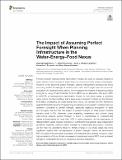The Impact of Assuming Perfect Foresight When Planning Infrastructure in the Water–Energy–Food Nexus
Author(s)
Payet-Burin, Raphael; Kromman, Mikkel; Pereira-Cardenal, Silvio J.; Strzepek, Kenneth M.; Bauer-Gottwein, Peter
Downloadfrwa-03-778003.pdf (5.216Mb)
Publisher with Creative Commons License
Publisher with Creative Commons License
Creative Commons Attribution
Terms of use
Metadata
Show full item recordAbstract
<jats:p>Perfect foresight hydroeconomic optimization models are tools to evaluate impacts of water infrastructure investments and policies considering complex system interlinkages. However, when assuming perfect foresight, optimal management decisions are found assuming perfect knowledge of climate and runoff, which might bias the economic evaluation of investments and policies. We investigate the impacts of assuming perfect foresight by using Model Predictive Control (MPC) as an alternative. We apply MPC in WHAT-IF, a hydroeconomic optimization model, for two study cases: a synthetic setup inspired by the Nile River, and a large-scale investment problem on the Zambezi River Basin considering the water–energy–food nexus. We validate the MPC framework against Stochastic Dynamic Programming and observe more realistic modeled reservoir operation compared to perfect foresight, especially regarding anticipation of spills and droughts. We find that the impact of perfect foresight on total system benefits remains small (&lt;2%). However, when evaluating investments and policies using with-without analysis, perfect foresight is found to overestimate or underestimate values of investments by more than 20% in some scenarios. As the importance of different effects varies between scenarios, it is difficult to find general, case-independent guidelines predicting whether perfect foresight is a reasonable assumption. However, we find that the uncertainty linked to climate change in our study cases has more significant impacts than the assumption of perfect foresight. Hence, we recommend MPC to perform the economic evaluation of investments and policies, however, under high uncertainty of future climate, increased computational costs of MPC must be traded off against computational costs of exhaustive scenario exploration.</jats:p>
Date issued
2021-12-14Department
Massachusetts Institute of Technology. Joint Program on the Science & Policy of Global ChangePublisher
Frontiers Media SA
Citation
Payet-Burin, Raphael, Kromman, Mikkel, Pereira-Cardenal, Silvio J., Strzepek, Kenneth M. and Bauer-Gottwein, Peter. 2021. "The Impact of Assuming Perfect Foresight When Planning Infrastructure in the Water–Energy–Food Nexus." 3.
Version: Final published version
ISSN
2624-9375
Keywords
General Medicine